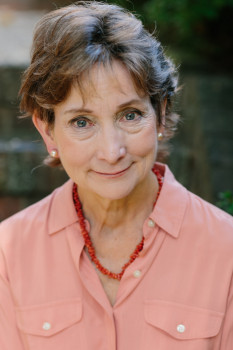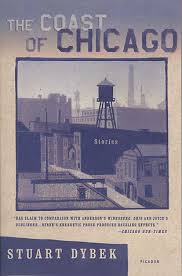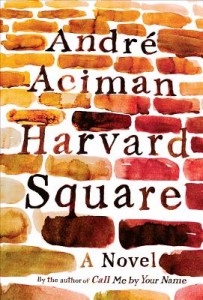
André Aciman frames his new novel, Harvard Square (W.W. Norton), with a college visit that the unnamed narrator makes with his son. “I’m so not into this,” the boy says, bored senseless by his father’s ramblings about the Harvard and Cambridge of his youth. And they are boring: “I still remembered my Coop number. I told him my Coop number.” The reader can’t help but share the boy’s apathy. Which is exactly where Aciman wants us. He’s set up the problem of his narrative—how to bridge that gulf, how to articulate longing for another time in this place. The novel’s solution is partly successful. Or rather, in addressing the problem, Aciman changes its terms. His novel’s sense of time and place gets defined, and ultimately subsumed, by the memory of the relationship that dominates its story.
That time is 1977, the place Harvard Square. The narrator recounts six months during his graduate studies when he—a bookish Jewish exile from Egypt (like Aciman)—befriends Kalaj, a profane Tunisian Berber cabbie who threatens to jar the narrator out of his Ivy-League sanctum. They come together at the Café Algiers, set up as an Old-World oasis in Cambridge’s desert of Waspy pretentions and intellectual seclusion. There, Kalaj holds forth on the “jumbo ersatz” nature of American culture, American women, and American fruit. Both men are facing expulsions of sorts: the narrator has failed his comprehensive exams and must pass on a second attempt or leave; Kalaj’s estranged wife is divorcing him, derailing his Green Card application. Each scorns the society that would reject him at the same time that their contempt hides a deep, abiding desire to be let in—to the Ivory Tower, to some promise of jumbo American life. The novel’s thematic interest, from the frame on in, is the emigrant’s sense of belonging and not belonging and his desire to belong and not to belong—the inadequacy of new homes and the sadness of old homes—true nostos algos.
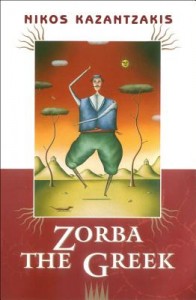 The narrator, a bibliophile, refers to Kalaj as “a cross between Zorba the Greek on steroids and Rameau’s nephew on speed.” The comparison, Aciman’s nod to his character’s antecedents, hits perhaps too close to the mark. One can’t help but hear Anthony Quinn’s Zorba delivering many of Kalaj’s lines: “With all your Harvard education, you don’t understand women, do you?” He is, at least at the novel’s outset, a caricature—pure bombast, “the perfect cross between desert seer and street hustler,” a man who contradicts everyone, himself especially. This depiction is deceptive, though, and gives way to a more nuanced view. In a lovely moment, the narrator sees Kalaj’s handwriting for the first time:
The narrator, a bibliophile, refers to Kalaj as “a cross between Zorba the Greek on steroids and Rameau’s nephew on speed.” The comparison, Aciman’s nod to his character’s antecedents, hits perhaps too close to the mark. One can’t help but hear Anthony Quinn’s Zorba delivering many of Kalaj’s lines: “With all your Harvard education, you don’t understand women, do you?” He is, at least at the novel’s outset, a caricature—pure bombast, “the perfect cross between desert seer and street hustler,” a man who contradicts everyone, himself especially. This depiction is deceptive, though, and gives way to a more nuanced view. In a lovely moment, the narrator sees Kalaj’s handwriting for the first time:
It was everything he wasn’t: neat, tentative, timid, the product of a frightened child in harsh, French, colonial schools where they taught you self-hatred for being who you were (if you were half French), for not being French (if you were an Arab), and for wishing to be French (if you were never going to be). The handwriting of someone who had never grown up, who’d had calligraphy beaten into him.
We are told, perhaps too many times, that the narrator sees Kalaj as his foil, “a stand-in for who I was, a primitive version of the me I’d lost track of and sloughed off living in America.” Though subtlety is wanting in places, tracing the narrator’s own evolution through his developing understanding of Kalaj is the great pleasure of Harvard Square. Indeed, his rising sense of self-awareness becomes the central action of the novel. And yet Kalaj is introduced in the prologue as “someone who came so close to altering the course of my life that today I might not even be my son’s father.” This is a curious admission so early in the narrative—Kalaj comes close to altering the course of the narrator’s life, but ultimately does not. Radical, unsettled, unstable, he is ultimately a conservative, stabilizing force.
Which is a surprising outcome. Kalaj is nicknamed Kalashnikov for his rapid-fire verbal interjections. From his introduction to the novel’s conclusion, the opening of his mouth is compared to a weapon’s discharge or a violent assault. To remind us of this explicitly, the text frequently supplies a Rat-tat-tat between Kalaj’s lines of dialogue. Sometimes this extends to Rat-tat-tat, rat-tat-tat-tat, and it doesn’t take long for the repetition to grate. But the threat of violence that comes with this imagery is never realized. Despite one brief spat, we are made to understand that Kalaj is mostly bluster, his expressions a manifestation of passion and a lure for women. (Kalaj and the narrator reel in many women over the course of the novel, but none is fully developed as a character.) He is a threat to nothing but the narrator’s sense of complacency.
Yet these constant reminders of violence—a machine-gun-mouthed Tunisian dressed as Che Guevara with “the cocksure swagger of someone who has just planted dynamite all over Cambridge and couldn’t wait to trigger the fuse, but not before coffee and a croissant”—also represent a missed opportunity to address larger political realities. Aciman for the most part shuns any intrusion by the outside world. (“For a few years in everyone’s life here, Harvard cordoned off the world, was the world.” Indeed.) We hear passing mentions of the release of Star Wars and Saturday Night Fever, the death of Maria Callas, and Anwar Sadat’s visit to Israel, but these are window dressing. In Aciman’s focus on his protagonists, we lose an awareness of the world and the political forces that move around and through the friends. We even lose a sense of Cambridge itself, significant here as a bastion of American privilege, but it could just as easily be another red-brick city playing the same role. The time period likewise feels forgettable. One can’t help but assume that Aciman has selected 1977 as an innocuous year in both the United States and the extended Middle East.
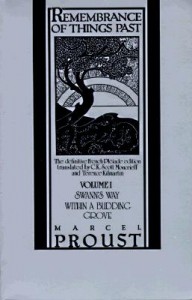 On a more minute level, though, Aciman captures something essential about the remembrance of times past. He has written extensively about Proust; he teaches Proust; critics labeled both of his prior novels Proustian. He mines the same vein here. And fair enough: Proust so mined in volume after volume. Like his literary predecessor, Aciman writes the prose of memory—deeply internalized, circling back, chronologically complex, a little sleepy, musical, processed and reconsidered, reiterative, qualified, layered with association and metaphor and interpretation. At times, the repeating motifs of that mental circling can begin to jangle (Rat-tat-tat-tat!), but Aciman is for the most part in control. His signature technique in this is to locate much of his discourse in a habitual past. The result is a dreamscape of nostalgic soft-focus:
On a more minute level, though, Aciman captures something essential about the remembrance of times past. He has written extensively about Proust; he teaches Proust; critics labeled both of his prior novels Proustian. He mines the same vein here. And fair enough: Proust so mined in volume after volume. Like his literary predecessor, Aciman writes the prose of memory—deeply internalized, circling back, chronologically complex, a little sleepy, musical, processed and reconsidered, reiterative, qualified, layered with association and metaphor and interpretation. At times, the repeating motifs of that mental circling can begin to jangle (Rat-tat-tat-tat!), but Aciman is for the most part in control. His signature technique in this is to locate much of his discourse in a habitual past. The result is a dreamscape of nostalgic soft-focus:
When I was not working at the library, I would go upstairs on the roof terrace of my building to sunbathe—with my folding chair, my bathing suit, my cigarettes, my books, and an endless string of watered-down Tom Collins which I dutifully replenished every two hours or so in my apartment, situated right under the terrace.
Pages and months can pass in this way before a specific scene suddenly fixes the reader in an extended moment. The effect is one that feels true to memory: the novel’s chronology gets skewed and confused, compressed and then expanded. Here Aciman is at his most successful, capturing the haze, the longing of memory, its distortions.
This is a book about the process of remembering. But Harvard Square doesn’t give the reader an understanding of what was essential about living in Harvard Square in 1977. Or, rather, the novel can’t honor the mission set out in the frame narrative, can never articulate for the son the full experience of this place at that time. Which seems to be, in the end, Aciman’s point. Harvard Square is not what’s important here. The personalities that populate the cities of memory, the language that can invoke them and needs to invoke them—these are Aciman’s interest, his strength, and his novel’s pleasures.
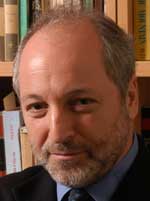
Links & Resources
- The Paris Review published an early version of Harvard Square‘s introduction to Kalaj. Rat-tat-tat.
- You can read a couple of Aciman’s New York Times columns on writing.
- Here’s a recent interview with Aciman at Full Stop.
- Watch a clip of Aciman talking about writing and memory.

